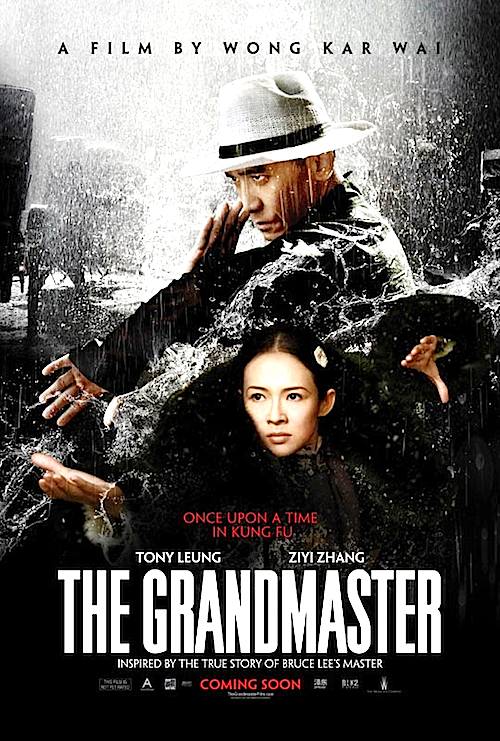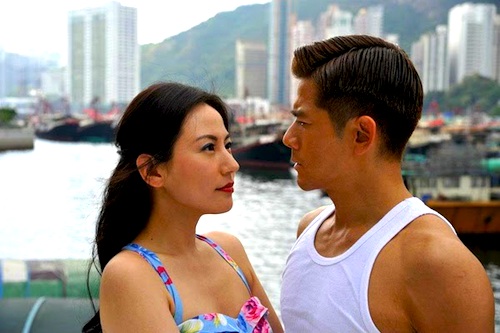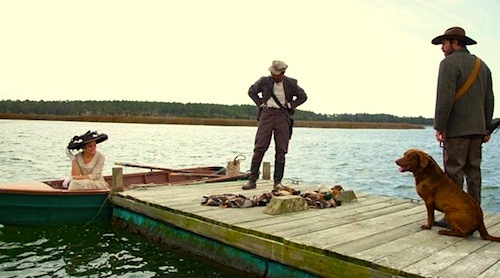By Joe Bendel. Ip Man has become a transcendent hero. All the films and stories about him are true, even when they contradict each other, because we need his example of heroic humility. Ip was a master of the southern style of kung fu known as Wing Chun. Settling in Hong Kong after the Communist takeover, he became the city’s most prominent martial arts teacher. He often lived a hand-to-mouth existence, but he attained a measure of immortality through his celebrated student, Bruce Lee. Posterity will not be so kind to the northern school, for classically tragic reasons revealed in The Grandmaster, Wong Kar Wai’s eagerly anticipated take on Ip Man, the man and the legend, which opens this Friday in New York.
Born to a life of privilege, Ip Man has become the leading proponent of the Wing Chun school of kung fu. For Grandmaster Gong Baosen of the northern 64 Hands school, Ip is a fitting sparring partner for his grand retirement tour. In observance of custom, challenges are made and met with grace. However, Gong’s intensely loyal daughter Gong Er is determined to take matters further. When she and Ip spar, it makes a profound impression on them both. No longer mere rivals, an ambiguous but palpable mutual attraction develops between them. Ip plans to travel north to see Gong and her 64 Hands style again, but the Japanese invasion rudely intervenes.
 The occupation years will be difficult for both non-lovers. Ip and his wife Zhang Yongcheng will mourn their children who succumb to starvation, while Gong Er watches in horror as Ma San, her father’s last great pupil-turned Japanse collaborator, usurps the 64 Hands. Years later, Ip Man and Gong Er will meet again in Hong Kong, but their wartime decisions will continue to keep them apart.
The occupation years will be difficult for both non-lovers. Ip and his wife Zhang Yongcheng will mourn their children who succumb to starvation, while Gong Er watches in horror as Ma San, her father’s last great pupil-turned Japanse collaborator, usurps the 64 Hands. Years later, Ip Man and Gong Er will meet again in Hong Kong, but their wartime decisions will continue to keep them apart.
Considering how long fans have waited, it is almost impossible for Grandmaster to live up to expectations, but happily it comes pretty close. Although separate and distinct from the Ip Man franchise distributed by Well Go USA, “Little” Tony Leung Chiu Wai has the perfect look and gravitas for the celebrated master, nicely finding his niche as the experienced leading man Ip Man, in between Donnie Yen’s young, confident Ip and Anthony Wong’s elder statesman Ip. Pushed and prodded by Wong, Leung arguably does some of his best martial arts work yet, but he also conveys the essence of the acutely disciplined Ip.
As good as Leung is, Ziyi Zhang more or less takes over the picture and that’s totally cool. She even gets the big pivotal fight scene, which delivers in spades. A haunting and seductive presence, she brings out genuinely Shakespearean dimensions in Gong.
As a martial arts film, Grandmaster offers plenty of show-stopping sequences, clearly and fluidly staged with only a hint of the extreme stylization that marked Wong’s Ashes of Time Redux. Surprisingly, though, the film is as much a lyrical epic of love and yearning. Indeed, the snowy northern climes and train station settings call to mind Doctor Zhivago more than Enter the Dragon. Of course, Wong fully understands the power of a passing glance and incidental touch, exquisitely conveying the perverse satisfaction of denial.
The Grandmaster is a very good film that should please genre fans and art house audiences in equal measure. It is probably the Ziyi Zhang, Tony Leung, and Wong Kar Wai collaboration we have hoped for since 2046. A sensitive but muscular portrait of Bruce Lee’s great master, it is a worthy addition to the Ip Man canon. Highly recommended, The Grandmaster opens this Friday (8/23) in New York at the Angelika Film Center and the AMC Empire.
LFM GRADE: A
Posted on August 21st, 2013 at 2:48pm.

